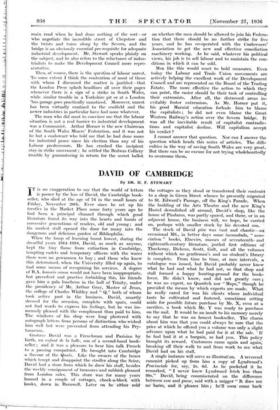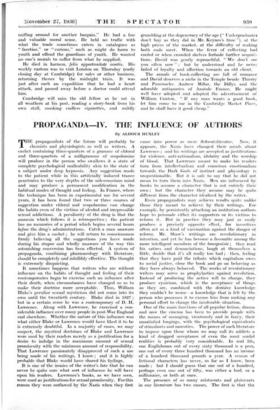DAVID OF CAMBRIDGE
By DR. H. F. STEWART• IT is no exaggeration to say that the world of letters is poorer by the loss of David, the Cambridge book seller, who died at the age of 76 in the small hours of Friday, November 20th. Ever since he set up his trestles in the Market Place some forty years ago he had been a principal channel through which good literature found its way into the hearts and hands of successive generations of readers, old and young ; and his modest stall opened the door for many into the dangerous and delicious garden of Bibliophilia: When the lamp of learning burnt lowest,. during the dreadful years 1914-1918, David, as much as anyone; kept the tiny flame from extinction in Cambridge, tempting cadets and temporary officers with the wares- there were no gownsmen to buy ; and those who knew this determined, when the University filled up again, to had some means of recognising his services. A degree of B.A. honoris causa would not have been inappropriate, but precedent and practice forbidding this, his friends gave him a gala luncheon in the hall of Trinity, under the presidency of Mr. Arthur Gray, Master of Jesus, the college of- Charles Whibley and " Q,". both of whom took active part in the business. David, smartly dressed for the occasion, complete with spats, could not find words to express his feelings, but he was im- mensely pleased with the compliment thus paid to him. The windows of his shop were long plastered with autograph letters from persons of distinction who wished him well but were prevented from attending his Pry- tanaeum.
Gustave David was a Frenchman and Parisian by birth, un enfant de la balk, son -of a second-hand book-. seller ; and it was a pleasure to hear him talk French to a passing compatriot. He brought into Cambridge a flavour of the Quais. Like- the owners of the boxes which tempt and disappoint the stroller along the Seine; David had a store from which he drew his stuff, besides the weekly consignment of treasures rand rubbish gleaned from London sales. This store Was for many years housed in a couple of cottages, chock-a;bloek with books, down in Barnwell.' Later on he-either sold- the cottages as they stood or transferred their contents to a shop in Green Street whence he' presently migrated to St. Edward's Passage, off the King's Parade. When the building of the Arts Theatre and the new King's Hostel -demolished all around, David's shop, like the house of Pindarus, was partly spared, and there, or in an adjacent house, the business will, we hope, be carried on, perhaps with smaller stock by his devoted son. '
The stock of David *re was vast and chaotic—an occasional MS., in better days some incunabula, " asso., eiation " books, Elzevirs, masses of seventeenth- and eighteenth-century literature, jostled first editions of Thackeray, Dickens, Scott, Galt, and all the volumes without which no gentleman's and no student's library is complete. From time to time, at rare intervals, .a catalogue was issued, but David probably never knew what he had and what he had not, so that shop and stall formed a happy hunting-ground for the book- lover. He didn't know, and did not greatly care ; he was no expert, no Quaritch nor "Maps," though he provided the means by which experts are made. What he really cared for was his clients whose individual, taste he cultivated and fostered, sometiMei setting aside for possible future purchase by Mr. X, even at a sacrifice, a book which Mr. Y was ready to purchase on the nail. It would be an insult to his memory merely to say that he was an honest bookseller. The charni about him was that you could always be sure that the price at which he offered you a volume was only a slight advance upon what he had paid for it at the sale. ' If he had had it at a bargain, so had you. This policy brought its reward. Customers came again and again; breaking' off their walk to' and from work to see what David had on his stall. "
A-single instance will serve as illustration. A reverend eanonitt picked • up from him a copy of Lyndwood'A Provinciale for; say, 2s. 6d. As he pocketed it he remarked, " I never knew' Lyndwood -fetch' less than 80s." David; being commiserated on the difference betkeeri esse and posse; said 'with a -snigger " It does me no" harm, and it" pleases Min ; he'll- soon' mine baek' sniffing around for another bargain." He had a fine and valuable moral sense. He held no traffic with what the trade sometimes enters in catalogues as " faeetiae," or ." curious," such as might do harm to youth and offend the guardians of youth. He wanted no one's morals to suffer from what he supplied.
He died in harness, felir opportunitate mortis. His weekly custom was to visit London on Thursday (early dosing day at- Cambridge) for sales or other business, returning thence by the midnight train. It was just after such an expedition that he had a heart attack, and passed away before a doctor could attend him.
Cambridge will miss the old fellow as he sat in all weathers at his post, reading a story-book from his own stall, smoking endless cigarettes, and mildly grumbling at the degeneracy of the age (" Undergraduates don't bay as they did in Mr. Keynes's time "), at the high prices of the market, at the difficulty of making both ends meet. When the fever of collecting had cooled or when crowded shelves forbade further acquisi- tions. David was gently reproachful, " We don't see you often now " ; but he understood and he never failed of loyalty and affection towards an old client.
The annals of book-collecting are full of romance and David deserves a niche in the Temple beside Thierry and Pancoucke, Andrew Millar, the Dillys and the adorable antiquaries of Anatole France. He might well have adopted and adapted the advertisement of William Caxton. " If any man wants a good book, let him come to me in the Cambridge Market Place, and he shall have it good cheap."















































 Previous page
Previous page